- +91 6284941359
- info@drrakeshsharmacardiologist.com
- Max Super Specialty Hospital, Mohali


Dr. Rakesh Sharma possesses a wealth of experience in the field of cardiology, accumulating approximately 12 years of practice. His expertise extends to a wide range of interventional cardiology procedures, making him a sought-after specialist in the following areas:
Atherosclerosis is a process in which a combination of fatty deposits, cholesterol, and other substances build up on and gradually damages the inner walls of the arteries, causing them to narrow and eventually harden. This may greatly restrict blood flow and possibly lead to serious cardiovascular complications, including heart attacks and strokes. The condition results from high cholesterol, high blood pressure, smoking, diabetes, obesity, and sedentary lifestyle.
The process of atherosclerosis itself can’t be completely reversed, but the progression of the condition can be slowed or even stabilized through some life changes and with the help of medications. In this regard, important steps include maintaining a healthy diet, appropriate and regular exercise, avoidance or quitting smoking, and keeping blood pressure and cholesterol levels under control. Severe cases of blockage may need other interventions, such as medication-like statins or procedures for better blood circulation, including angioplasty or bypass surgery.
Smoking reduces the lining of the arteries due to which fatty material is piled up to narrow the arteries and, therefore restrict the supply of blood towards the heart. It elevates the pressure of the blood, reduces “good” HDL cholesterol, which again increases the risk of blood clots, thereby increasing the risk factors for heart disease, such as heart attacks and strokes.
Yes, quitting smoking markedly reduces the risk for heart disease. After just one year without cigarettes, coronary heart disease risk is half that of continuing smokers. It must be said that the human heart and blood vessels start to repair themselves in as little as few years after quitting, risks of stroke and heart disease can fall to the level of nonsmokers in as few as 5 to 15 years.
High blood pressure, high levels of cholesterol in the blood, smoking, diabetes, obesity, a sedentary lifestyle, unhealthy diet, and excessive alcohol consumption are major risk factors for CAD. Moreover, advancing age, genetic predisposition to heart disease, and male gender-all increase the chances of developing CAD at an earlier age.
Most CAD risk factors are modifiable, meaning they can be managed or changed in order to decrease one’s risk. Key is a heart-healthy lifestyle that includes a balanced diet rich in fruits, vegetables, whole grains, regular exercise, weight management, stress management, no smoking, and management of conditions such as high blood pressure, diabetes, and high cholesterol through medication and lifestyle modification. Regular visits to the healthcare provider may also aid in monitoring and reducing risk.
